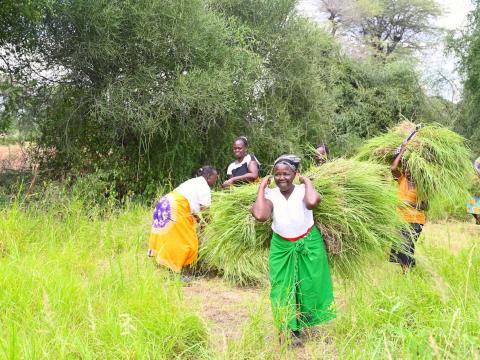Women use trees to boost fodder production in drought prone areas

By Sarah Ooko, World Vision Senior Commmunications & Media Officer, Kenya
The land is dry and bare in parts of Baringo County, where communities have been suffering frequent droughts over the years due to climate change.
During the long dry spells, when pasture is scarce, men walk over long distances with large herds of cattle in search of pasture and may stay away for months until the dry season ends.
Women, who remain behind to take care of the homestead and children, are usually charged with the responsibility of herding part of the livestock left behind.

Each morning, many of them will direct the cattle into forested areas in search of available pasture near rivers or streams.
The task is no mean feat; it exposes them to threats by wild animals, attacks by cattle raiders or harm by pastoralists from neighbouring communities competing for the limited pastures available.

Aside from the fatigue they endure while making the journey to, and from the forest each day, many women live in fear of being sexually abused or kidnapped by raiders.
The daily search for grazing land also robs the women of the time and opportunity to take good care of their children and engage in other income generating activities.Despite these hurdles, tides are slowly but surely changing in most of the affected communities.

World Vision in partnership with the government, has been training and empowering women to increase tree cover in their land and boost pasture growth through an innovative approach known as Farmer Managed Natural Regeneration (FMNR).The initiative is funded by World Vision donors from Australia, under the Central Rift FMNR Scale-Up project in Baringo County.
Thanks to the technique, the women have been able to revive the previously 'dead' indigenous trees on their farms and encourage the growth of many more through proper pruning and management of the trees.

Grace, one of the lead farmers who has received extensive training on the FMNR approach is all smiles this year.

"The work I have been doing to boost the growth of the indigenous trees in my home is finally paying off. The trees have made it possible for the grass seeds I received from World Vision to grow fast and thrive. So, I have sufficient pasture for my livestock now, in spite of the drought," she says.
“Trees encourage the growth of grass as they boost soil fertility by drawing nitrogen from the air and transferring it to the soil through their roots and litter. Trees also prevent soil erosion, which usually affects the productivity of plants. They also increase water infiltration in the soil which promotes the growth of grass and other crops," says Emily Ouko, the Manager of the GIZ FMNR Scale-Up project in Kenya.

Thanks to the sufficient grass, Grace's cattle are still alive and healthy amid the drought that has affected communities in Marigat, Baringo County.
"The milk production of my cows is still high so each morning I can prepare white tea for my children which they really love. Sometimes, they just drink plain milk because there is plenty of it. I am even selling some to generate income," she says.

As she enjoys the bumper grass harvests and milk production, Grace is also sharing some of these benefits with her less fortunate neighbours.
In addition, she has trained other women on how to practice the FMNR technique and grow grass so her entire village can keep benefiting from these initiatives.

"When Grace made her first harvest, she shared the grass seeds which we planted. Nowadays, we no longer risk our lives by going into the dangerous forest in search of pasture. We also have enough time to play with our children and engage in other activities like crop farming," says Betty, one of the women empowered by Grace.
She adds, "We are following her example too, by ensuring that we also spread the knowledge to other women so the entire community can prosper.”

As a result of the training offered by Grace, the women's lives have improved and they are now able to provide adequately for their children and families.